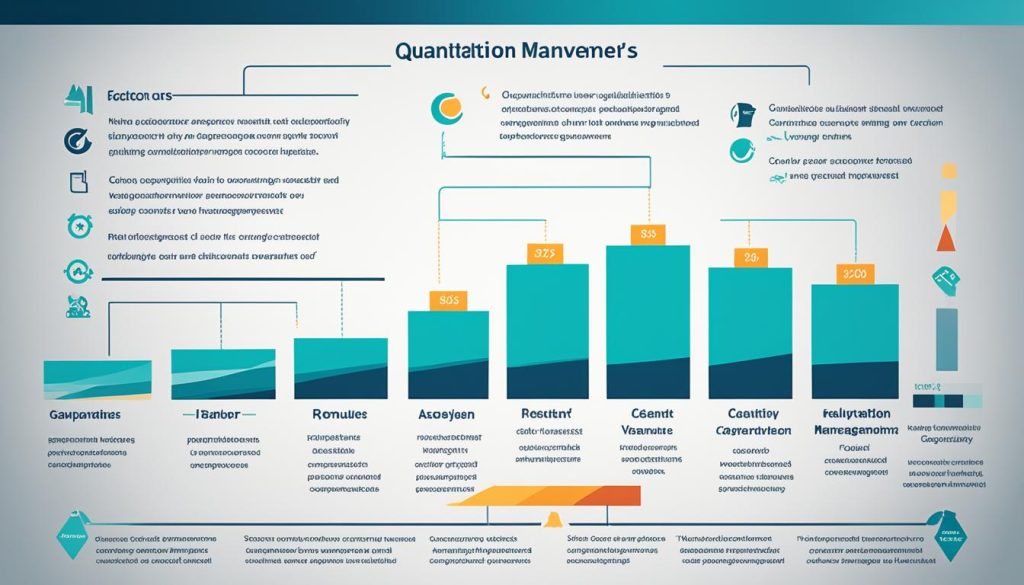Valuing a wealth management firm is a strategic process that requires a deep understanding of its worth. By employing the right techniques and methods, you can accurately determine the value of a wealth management firm, providing valuable insights for buyers, sellers, and investors.
In this article, we will explore the importance of business valuation in the context of wealth management firms. We will delve into the key components of valuation and discuss different approaches that can be used to determine a firm’s value. Additionally, we will unveil the business valuation formula, which plays a pivotal role in assessing the true worth of a wealth management firm. Finally, we will touch upon the art of negotiation in the valuation process, highlighting its significance in reaching mutually beneficial agreements.
Whether you are a potential buyer, seller, or investor, understanding the strategic valuation techniques for determining the value of a wealth management firm is essential for informed decision-making and successful transactions.
Key Takeaways:
- Valuing a wealth management firm requires a strategic approach and proper understanding of its worth.
- Business valuation plays a crucial role in understanding the worth of a wealth management firm.
- Intrinsic valuation is one of the most widely used methods for valuing wealth management firms.
- Various components contribute to the valuation of a wealth management firm.
- When valuing a wealth management firm, different approaches can be used, depending on the specific circumstances.
The Importance of Business Valuation
When it comes to valuing a wealth management firm, business valuation is of utmost importance. It serves as a fundamental step in understanding the true worth of the firm. By assessing various factors and employing the right methods and techniques, a comprehensive valuation can be conducted to determine an accurate and fair value.
Business valuation involves the careful evaluation of multiple factors that contribute to a firm’s value. These factors include cash flows, growth potential, and risk. By analyzing these key elements, interested parties can gain insights into the financial performance, growth prospects, and potential risks associated with the firm.
One of the core elements of business valuation for wealth management firms is cash flows. Understanding the firm’s cash flow patterns is essential in assessing its profitability and sustainability. Methods and techniques for valuing a wealth management firm closely examine the historical cash flows and project future cash flows to determine the firm’s potential profitability.
Growth potential is another crucial factor in business valuation. Investors and buyers are particularly interested in firms that demonstrate a strong ability to grow and adapt to changing market conditions. By considering factors such as the firm’s client base, market presence, and growth strategies, valuers can determine the firm’s potential for continued success and increasing value.
Risk assessment is an integral part of business valuation as well. Valuers evaluate the risks associated with a wealth management firm, including regulatory risks, client concentration risks, and industry-specific risks. By identifying and analyzing these risks, valuers can assess the impact they may have on the firm’s valuation.
By employing a combination of methods and techniques for valuing a wealth management firm and considering these crucial factors, a comprehensive valuation can be achieved. This not only facilitates informed decision-making but also ensures that buyers and sellers can negotiate based on the true value of the firm.
Next, we will dive deeper into one of the widely used valuation methods for wealth management firms: intrinsic valuation. Stay tuned!
Intrinsic Valuation: A Key Method for Valuing Wealth Management Firms
When it comes to determining the value of a wealth management firm, intrinsic valuation stands out as one of the most widely used and reliable methods. This approach involves a comprehensive analysis of various factors, including cash flows, growth potential, and risk assessment, in order to estimate the intrinsic value of the firm.
Intrinsic valuation requires a deep understanding of the business and meticulous calculation of discount rates and free cash flows. By carefully considering the future expectations and performance of the firm, this method provides a more accurate representation of its true worth.
“Intrinsic valuation is like peering into the soul of a wealth management firm, unraveling its hidden value and uncovering its potential,” says Jonathan Stevens, a renowned financial expert.
Techniques involved in valuing a wealth management firm through intrinsic valuation include:
- Determining cash flows: Assessing the historical and projected cash flows is essential for estimating the firm’s value. This involves analyzing not only revenue streams but also expenses and potential risks.
- Growth potential analysis: Evaluating the firm’s growth potential is crucial in understanding its future value. This includes examining factors such as market trends, client base, and competitive landscape, which can significantly impact the firm’s worth.
- Risk assessment: Identifying and assessing the risks associated with the wealth management firm is a vital step in intrinsic valuation. Factors such as regulatory changes, economic conditions, and client retention rates need to be carefully considered to estimate the firm’s true worth.
- Discounted cash flows: Calculating the present value of projected cash flows is an integral part of intrinsic valuation. This involves applying discount rates that account for the time value of money and the firm’s specific risk profile.
By utilizing these techniques and conducting a comprehensive intrinsic valuation, investors, buyers, and sellers can gain a clearer understanding of the value of a wealth management firm.

The Components of Valuation
Valuing a wealth management firm involves assessing various components to determine its overall worth. These components include:
- Financial Performance: Evaluating the firm’s financial health, including revenue, profitability, and cash flows, is essential in determining its value. A wealth management firm with a strong financial performance is likely to be valued higher.
- Growth Potential: Assessing the firm’s growth potential is crucial as it directly influences its value. The ability to attract new clients, introduce innovative services, and expand into new markets can significantly enhance the valuation of a wealth management firm.
- Industry and Market Conditions: Understanding the industry and market conditions in which the firm operates is essential. Factors such as market trends, competition, and regulatory landscape can impact the valuation.
- Competitive Landscape: Analyzing the firm’s position within the competitive landscape provides insights into its market share, client base, and differentiation strategies. A wealth management firm with a strong competitive advantage may command a higher valuation.
- Risk Assessment: Assessing the firm’s risk profile is critical in determining its value. Risk factors such as client concentration, regulatory compliance, and operational risks can affect the valuation.
By evaluating these components, a more accurate valuation can be achieved, providing a comprehensive understanding of the wealth management firm’s worth.

“Valuation is not just about financial numbers; it’s about understanding the various components and factors that contribute to a firm’s value. By carefully analyzing the financial performance, growth potential, market conditions, competitive landscape, and risk assessment, one can arrive at a realistic and reliable valuation.” – Wealth Management Expert
Different Approaches to Business Valuation
When valuing a wealth management firm, various approaches can be utilized, depending on the specific circumstances and objectives of the valuation. Each approach offers its own unique insights and calculations to estimate the value of the firm based on its income potential. Let’s explore some commonly used methods in wealth management firm valuation.
Income Approach
The income approach is a widely used method in valuing wealth management firms. It involves estimating the present value of the firm’s expected future income, taking into consideration factors such as capitalization of earnings and discounted cash flow. By analyzing the income generated by the firm, this approach provides a holistic view of its value.
Capitalization of Earnings
The capitalization of earnings method determines the value of a wealth management firm by capitalizing its expected future earnings. It calculates the present value of the firm’s expected earnings stream by applying a capitalization rate. This approach is suitable when there is a stable and predictable income pattern for the firm.
Discounted Cash Flow
The discounted cash flow (DCF) method focuses on estimating the value of a wealth management firm based on the present value of its projected future cash flows. This approach takes into account the time value of money, discounting the projected cash flows to their present value using an appropriate discount rate. The DCF method provides a comprehensive analysis of the firm’s income potential.
Single-Period Capitalization
The single-period capitalization approach determines the value of a wealth management firm by capitalizing its earnings for a single period. It takes into consideration the firm’s projected earnings and applies a capitalization rate to calculate its value. This method is often used when there is a significant change expected in the firm’s earnings stream.
Multi-Period Discounting
The multi-period discounting method estimates the value of a wealth management firm by discounting its projected cash flows over multiple periods. It considers the time value of money and applies discount rates to the projected cash flows for each period. This approach provides a more detailed analysis of the firm’s future income potential.
Gordon Growth Model
The Gordon growth model, also known as the dividend discount model, is used to value wealth management firms that pay dividends. This method calculates the present value of the firm’s future dividends, taking into account the firm’s dividend growth rate and the required rate of return. The Gordon growth model offers insights into the firm’s dividend-paying capacity.
Terminal Value
In wealth management firm valuation, the terminal value represents the value of a firm beyond the projection period. It is often estimated using various methods, such as the Gordon growth model or the exit multiple approach, to capture the firm’s long-term sustainable growth. The terminal value complements the valuation by incorporating the firm’s future growth potential.
By utilizing these different approaches, wealth management firms can gain a comprehensive understanding of their value, enabling informed decision-making and strategic planning. The specific approach chosen for valuation depends on the specific characteristics and goals of the firm being valued.
Valuation is both an art and a science. There is no one-size-fits-all approach, and it requires thoughtful analysis and consideration of various factors to accurately assess the value of a wealth management firm.

The Business Valuation Formula: Unveiling the True Worth of a Wealth Management Firm
When it comes to determining the market value of a wealth management firm, the business valuation formula is an essential tool. This comprehensive approach takes into account various factors, such as projected cash flows, to calculate the true worth of a firm.
The formula begins with a detailed analysis of the firm’s forecasted cash flows. This includes evaluating its future revenue and expenses, as well as making adjustments to account for factors such as owner compensation and discretionary expenses. By incorporating these adjustments in projected cash flows, a more accurate valuation can be achieved.
Furthermore, the business valuation formula provides a foundation for establishing a sale price. It allows potential buyers and sellers to understand the perceived value of the firm and negotiate based on this information. This not only facilitates fair and transparent transactions but also helps both parties make informed decisions.

The business valuation formula is a powerful tool that unveils the true worth of a wealth management firm. By considering all relevant factors and making adjustments in projected cash flows, it provides a comprehensive assessment that enables strategic decision-making.
By utilizing the business valuation formula, individuals and businesses can confidently determine the market value of a wealth management firm. This knowledge empowers them to make informed investment decisions, whether it involves buying or selling a firm.
The Art of Negotiation in Business Valuation
Valuation of a wealth management firm often involves intense negotiations and extensive discussions to address adjustments and fine-tune the valuation. Parties involved must carefully deliberate and find common ground to ensure a fair and accurate assessment of the firm’s value. The art of negotiation plays a crucial role in reaching a mutually beneficial agreement.
Importance of Careful Deliberation in Valuation
When it comes to valuing a wealth management firm, careful deliberation is paramount. This process requires in-depth analysis, where various factors are considered and weighed against one another. Without careful deliberation, important elements that contribute to the firm’s value may be overlooked or undervalued.
One of the key aspects of careful deliberation is taking the time to understand the firm’s financial performance, growth potential, competitive landscape, and risk assessment. These factors influence the overall value of the firm and help guide negotiations towards a fair assessment.
Finding Common Ground in Valuation Discussions
Valuation discussions can sometimes be challenging due to differing perspectives and expectations. However, finding common ground is crucial in order to ensure a successful valuation process. By actively listening, understanding each party’s concerns, and seeking areas of agreement, negotiations can progress towards a mutually beneficial outcome.
“Through effective communication and a willingness to collaborate, parties can find common ground and bridge the gaps in their valuation expectations.”
During negotiation, it’s important to focus on shared goals and objectives rather than getting stuck on individual demands. By finding areas of agreement and compromise, parties can work together to reach a valuation that accurately reflects the firm’s worth.
Additionally, engaging in open and transparent discussions can help build trust among the parties involved. By fostering an environment of trust, negotiations can proceed more smoothly, leading to a more accurate and satisfactory valuation outcome.

The image above visually represents the importance of negotiation in wealth management firm valuation. Negotiation is a crucial step in the valuation process that allows parties to reach a fair and mutually beneficial agreement.
Conclusion
Valuing a wealth management firm requires a comprehensive understanding of its value and strategic decision-making in valuation. By utilizing the right methods and techniques, such as intrinsic valuation and the business valuation formula, accurate assessments can be conducted.
Thorough analysis of the firm’s financial performance, growth potential, and industry conditions is essential for an accurate valuation. Additionally, careful negotiation and finding common ground play a crucial role in reaching mutually beneficial agreements.
Through proper valuation, buyers and sellers can make informed decisions based on the true worth of the firm. This ensures transparency and fairness in the wealth management industry and enables successful transactions.




No comments! Be the first commenter?